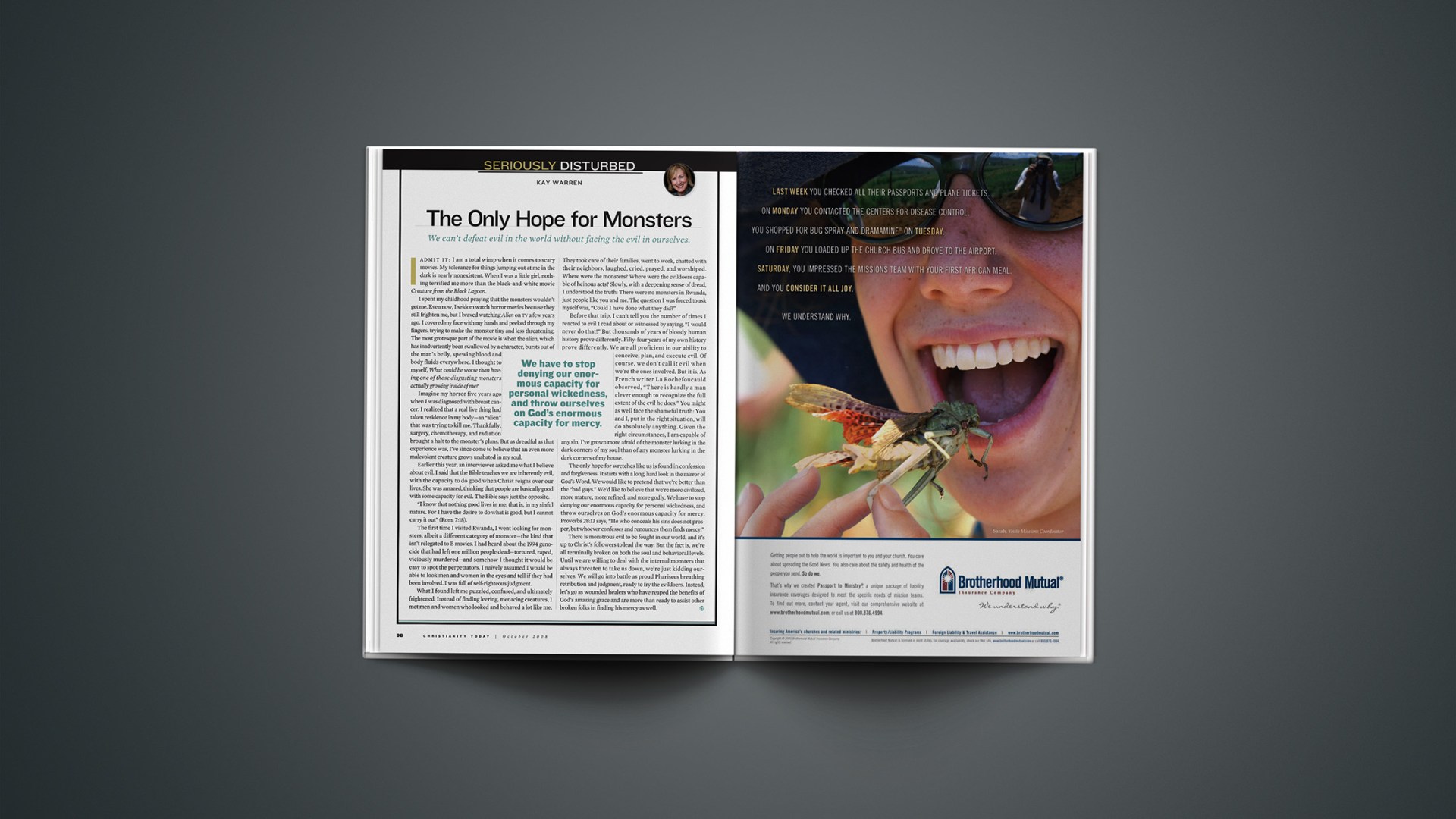I admit it: I am a total wimp when it comes to scary movies. My tolerance for things jumping out at me in the dark is nearly nonexistent. When I was a little girl, nothing terrified me more than the black-and-white movie Creature from the Black Lagoon.
I spent my childhood praying that the monsters wouldn’t get me. Even now, I seldom watch horror movies because they still frighten me, but I braved watching Alien on TV a few years ago. I covered my face with my hands and peeked through my fingers, trying to make the monster tiny and less threatening. The most grotesque part of the movie is when the alien, which has inadvertently been swallowed by a character, bursts out of the man’s belly, spewing blood and body fluids everywhere. I thought to myself, What could be worse than having one of those disgusting monsters actually growing inside of me?
Imagine my horror five years ago when I was diagnosed with breast cancer. I realized that a real live thing had taken residence in my body—an “alien” that was trying to kill me. Thankfully, surgery, chemotherapy, and radiation brought a halt to the monster’s plans. But as dreadful as that experience was, I’ve since come to believe that an even more malevolent creature grows unabated in my soul.
Earlier this year, an interviewer asked me what I believe about evil. I said that the Bible teaches we are inherently evil, with the capacity to do good when Christ reigns over our lives. She was amazed, thinking that people are basically good with some capacity for evil. The Bible says just the opposite.
“I know that nothing good lives in me, that is, in my sinful nature. For I have the desire to do what is good, but I cannot carry it out” (Rom. 7:18).
The first time I visited Rwanda, I went looking for monsters, albeit a different category of monster—the kind that isn’t relegated to B movies. I had heard about the 1994 genocide that had left one million people dead—tortured, raped, viciously murdered—and somehow I thought it would be easy to spot the perpetrators. I naïvely assumed I would be able to look men and women in the eyes and tell if they had been involved. I was full of self-righteous judgment.
What I found left me puzzled, confused, and ultimately frightened. Instead of finding leering, menacing creatures, I met men and women who looked and behaved a lot like me. They took care of their families, went to work, chatted with their neighbors, laughed, cried, prayed, and worshiped. Where were the monsters? Where were the evildoers capable of heinous acts? Slowly, with a deepening sense of dread, I understood the truth: There were no monsters in Rwanda, just people like you and me. The question I was forced to ask myself was, “Could I have done what they did?”
Before that trip, I can’t tell you the number of times I reacted to evil I read about or witnessed by saying, “I would never do that!” But thousands of years of bloody human history prove differently. Fifty-four years of my own history prove differently. We are all proficient in our ability to conceive, plan, and execute evil. Of course, we don’t call it evil when we’re the ones involved. But it is. As French writer La Rochefoucauld observed, “There is hardly a man clever enough to recognize the full extent of the evil he does.” You might as well face the shameful truth: You and I, put in the right situation, will do absolutely anything. Given the right circumstances, I am capable of any sin. I’ve grown more afraid of the monster lurking in the dark corners of my soul than of any monster lurking in the dark corners of my house.
The only hope for wretches like us is found in confession and forgiveness. It starts with a long, hard look in the mirror of God’s Word. We would like to pretend that we’re better than the “bad guys.” We’d like to believe that we’re more civilized, more mature, more refined, and more godly. We have to stop denying our enormous capacity for personal wickedness, and throw ourselves on God’s enormous capacity for mercy. Proverbs 28:13 says, “He who conceals his sins does not prosper, but whoever confesses and renounces them finds mercy.”
There is monstrous evil to be fought in our world, and it’s up to Christ’s followers to lead the way. But the fact is, we’re all terminally broken on both the soul and behavioral levels. Until we are willing to deal with the internal monsters that always threaten to take us down, we’re just kidding ourselves. We will go into battle as proud Pharisees breathing retribution and judgment, ready to fry the evildoers. Instead, let’s go as wounded healers who have reaped the benefits of God’s amazing grace and are more than ready to assist other broken folks in finding his mercy as well.
Copyright © 2008 Christianity Today. Click for reprint information.
Related Elsewhere:
Kay Warren’s previous Seriously Disturbed columns include:
Joining the Resistance | It took seeing seven-year-old prostitutes to jolt me out of my apathy. (August 13, 2008)
Talk and Walk | Getting our body in sync with our message. (June 5, 2008)
Wiping out HIV | It’s good for the soul to fight the virus. (April 28, 2008)










